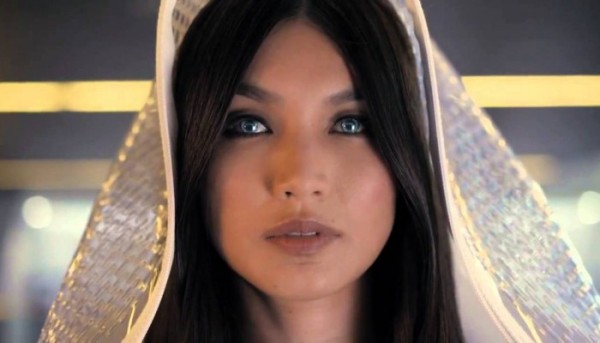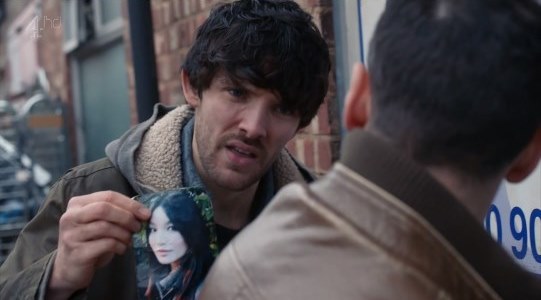
Courtesy of Channel 4 / AMC
AMC and the UK’s Channel 4 team up for new drama series Humans, an adaptation of a beloved (albeit little seen) Swedish series about a near future world of robot workers.
Let’s bitch it out…
Full confession: I’ve seen the first season of Real Humans / Äkta människor, the original Swedish series from which Humans is adapted. I’m not fond of people who do nothing but comment on the successes and failures of adaptations, so I’ll refrain as often as possible from making comparisons, especially since we can assume that nearly 100% of Humans’ audience are newcomers.
All of that to say that this is a relatively faithful adaptation and a solid first episode. With only an eight episode run, Humans needs to hit the ground running and while some of the larger, world-building elements that helped make Real Humans so compelling are missing, this first episode of the UK/US co-production does well to shrink its narrative focus down so that we can jump right in.
By shrink down the narrative I mean focusing most of the drama around a single family, the Hawkins, through whom the majority of the story is seen and told. We open with a familiar harried family: breadwinner and distant wife/mother Laura (Katherine Parkinson) has been held up on the latest business trip, leaving husband Joe (Tom Goodman-Hill) in charge of their three kids and the house. Frustrated, Joe heads down to a Synth seller with his youngest, Sophie (Pixie Davies) to purchase a domestic aide, a beautiful android that the family eventually names Anita (Gemma Chan).
Anita’s acclimatization to the Hawkins household – and vice versa – occupies most of the first episode. Laura, upon arriving home, is immediately put out; she frets that Anita isn’t good for the kids and that she’s being replaced. Although Joe quickly clarifies that Anita is there to take the strain out of their relationship and provide them with more time together, it’s not hard to understand Laura’s concern when Anita seamlessly takes over the household responsibilities, up to and including reading Sophie goodnight stories.
Eldest daughter Mattie (Lucy Carless) is similarly distrustful, though she’s clearly more focused on the impact that Synths have on her future than her immediate life. When confronted by her parents, Mattie laments her lack of future in a world where Synths can revolutionize an industry overnight. While Mattie’s brain surgeon example seems a little too serious, we do see clear evidence that Synths have taken over a variety of menial labour positions. A television news program and a secondary character (discussed later) clarify that Synths exist primarily to fill the jobs that humans do not or should not occupy, a clear example of the show’s social commentary about race, age and work. It’s not hard to spot that nearly all of the Synths that we see are young, fit and ethnic. Hell, even the opening scene set in a factory equates the robots with mass produced perfection.
In flashbacks set in a wooded area five weeks before the Hawkins purchase her, Anita – aka Mia – is one of several liberated Synths travelling alongside Leo (Colin Morgan). After nearly all of the sentient Synths are captured, Leo’s quest to recover Anita, his true love, we learn how poorly Synths are treated by humans. It’s not just petty humiliations like getting shot with a BB gun in the ass or being asked point blank if they’re “just a stupid robot”; it’s being prostituted out in locked-room brothels. Easily the most deplorable scene in the premiere occurs after Leo visits Niska (Emily Berrington), a freed Synth who is hiding her true nature by disguising herself as a sexbot. After refusing Leo’s suggestion that she turn off her pain receptacle because she “was made to feel”, Niska’s bleak existence is clarified in a single humiliating encounter with a customer who enters the room barking sexual instructions without so much as a greeting. Is this comparable to the treatment of human prostitutes or other people pressed into indentured servitude? Possibly, but like all good science-fiction tales, these “Others” are standing in for oppressed peoples and minorities in order to deliver a political allegory that viewers can engage with. Anita’s introduction to Joe and Sophie confirms this: her angelic face is unwrapped from a shrink-wrapped case and cardboard box like she’s a shiny new appliance. Sophie’s glee in discovering Anita’s “pretty” appearance infers a doll-like relationship – Anita is to become a surrogate mother and maid, as well as a life-sized Barbie that does her bidding. Even Anita’s name is owned: in one of Humans‘ clearest inferences of Synth as property, the family decides her name for her, and when Anita repeats it back she adopts the Hawkins’ last name like a twisted marriage contract.
While Humans‘ dig at middle class consumerism is a satisfying allegorical change of pace from other cookie culture series, the series’ other major theme is substantially more familiar. With the eternally discussed philosophical question “what does it mean to be human?” are the series’ core, we are safely situated in standard science-fiction territory. Thankfully it’s not quite so black and white. Humans is interested in debating the morals and ethics of using consciousness-free workers and the series has a rebellious thread since Anita is, in fact, sentient. In addition to the brief flashback before her abduction when she is truly free, there are repeated instances throughout the premiere that Anita is more understanding, humane and introspective than the family she works for. These ideas come into play most clearly when Anita is caught staring at the moon and (possibly?) listening to the news about Synths while ironing. Clearly these examples are also intended to tease a potential discovery by Laura, who is already suspicious of Anita, so it remains to be seen what will happen following the cliffhanger ending when Anita walks out of the house with Sophie in the middle of the night.
Humans clearly means to promote a dialogue among viewers about how we define humanity, cognition and free-will. When Anita accidentally burns Laura with a hot pan in order to protect Sophie, is that really just part of her programming or is she demonstrating a motherly reaction to a child in danger? After only a single episode, it’s too soon to tell, but it is clear that Anita is a fascinating character and Gemma Chan is the show’s secret weapon.

Courtesy of Channel 4 / AMC
Other Observations:
- Leo’s rendezvous with Fred (Sope Dirisu) is compromised when Hobb (Danny Webb) identifies Fred as sentient. I’m unsure how this scene played with UK viewers, but to me the location – a hothouse vegetable picking operation – read like an mild commentary on non-unionized, immigrant labour (the US and Canada both employ substantial amounts of Mexican labourers to do this kind of back-breaking, time intensive work).
- Speaking of sci-fi tropes: Hobb later explains to his employer how a potential singularity could occur if the robots gain autonomy and refuse to do the bidding of humans any longer. This idea is then conflated by the Channel 4 interview the Hawkins family watch debating and analyzing the role and safety of Synths in society. Both examples feel a little too obviously exposition-y, so I’m hopeful that these ideas play out more organically in the future. Give me the scene when Laura catches Anita staring at the moon any day.
- The B-plot involves an elderly doctor, George Millican (William Hurt) who is overly protective of his outdated synth, Odi (Will Tudor). When Odi malfunctions at the grocery store, Millican is informed by DI Pete Drummond (Neil Maskell) that the six year old android must be recycled. Despite Odi’s self-proclaimed fatal errors, Millican is unable to destroy the only being who remembers his late wife. While I love Hurt and this story provides an interesting counterpoint to the Anita/Leo scenes, I can’t say I’m incredibly invested in Odi’s fate.
- Drummond has his own Synth connection: his wife, an apparent car accident victim, has a vaguely intimate relationship with hers, Simon (Jack Derges). Not only does Simon carry her around, he also offers rub-downs. Perhaps I’m just reading too much into Neil Maskell’s performance after watching him in Channel 4’s Utopia, but Drummond doesn’t seem overly pleased with Simon’s “hands-on” approach.
- Speaking of scary: after threatening Anita with a gun in her bedroom, can we assume that Mattie is a slightly less psychotic female Joffrey (from Game Of Thrones)? She’s a wee bit sadistic, no?
- It’s safe to assume that Anita has some memories before she was wiped for sale, though not the same sentient feelings as Niska. What then to make of the mysterious water imagery Anita remembers when she sees images of Sophie as a baby?
- Finally, a note about the appearance of the Synths. On Real Humans, the make-up is much more pronounced, so that the robots are immediately visually distinct, a trait that has been downplayed and transferred into the actor’s contact lenses instead. I found it interesting, then, that many of the advance reviews take notice, and even emphasize, how distinctive the make-up is.
Your turn: what did you think of the premiere? Is Gemma Chan the most intriguing actor on the series? Did Niska’s scene feel appropriately horrible to you? Did you immediately pick up on the race/age/work allegorical reading? Do you care about Millican and Odi’s storyline? Sound off below.
Humans airs Sundays at 9pm EST on AMC. Here’s a preview of next week’s episode
https://www.youtube.com/watch?v=sNSOMfQMwvI